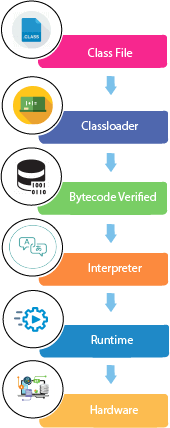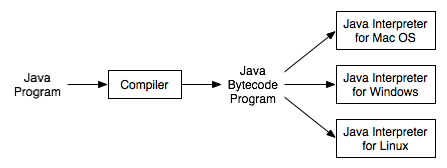
- COMPILING JAVA CODE HOW TO
- COMPILING JAVA CODE CODE
- COMPILING JAVA CODE SERIES
- COMPILING JAVA CODE DOWNLOAD
In the source-file mode, the effect is as if the source file is compiled into memory and the first class found in the source file is executed. (There will be more information on this when I discuss shebang files later in this tutorial.) This is necessary for cases when the source file is a ¬ script to be executed and the name of the source file does not follow the normal naming conventions for Java source files. java extension, the -source option must be used to force source-file mode. Note that I said file name and not class name.

In other words, Java will look for the first. The -source option may be used to specify the source version of the source code. java extension, the source-file mode is selected and that file will be compiled and run. For example, if you wish to set a classpath when the source file uses external dependencies.įor the second item, if the filename identifies an existing file with the. You can still provide options to the Java command before the source file name.
COMPILING JAVA CODE CODE
The Java runs out and then you see that we’re passing in just the source code file rather than the class file and it internally compiles this source file then runs the resulting compiled code and finally, the result is shown to the console. You can now just say javaHelloWorld.java. Now I want you to delete the class file you’ll understand why in a moment: If you haven’t already, create the HelloWorld.java file, compile it, and run the resulting class file.
COMPILING JAVA CODE HOW TO
I won’t dive into this feature’s implementation details, but will focus all my efforts on demonstrating how to use this feature by trying out different samples so you get ideas on how the feature can be used in your coding. Now let’s begin the way we always do when we start learning something new - yes exactly as you guessed - with the simplest example: Hello World! To work around this limitation, all the classes have to be defined in the same file, but there are no restrictions on the number of classes in the file. You cannot add additional source files to be compiled in the same run. However, this feature is limited to code that resides in a single source file.

The source code is compiled in memory and then executed by the interpreter. This feature allows you to execute a Java source code file directly using the java interpreter. JEP 330, Launch Single-File Source-Code Programs, is one of the exciting features introduced in the JDK 11 release. In this tutorial, I use a plain text editor rather than a Java IDE because I want to avoid any IDE magic and use the Java command line directly throughout the terminal.
COMPILING JAVA CODE DOWNLOAD
To run all the demos provided in this tutorial you will need to download the Java SE 11 JDK.


COMPILING JAVA CODE SERIES
You can also automate tasks, such as writing Java scripts and then executing them as scripts at the operating system level.įor more information about the new Jshell 10+, see the following two tutorials in this series about this topic: Professionals can also make use of these tools to explore new language changes or to try out an unknown API. This feature is particularly useful for someone new to the language who wants to try simple programs when you combine this feature with jshell, you get a great beginner’s toolset. In Java SE 11, you get the option to launch a single source code file directly, without compilation. More in this series This content is part of the “ Java theory and practice” series.īut what if you want to quickly test a piece of code, or if you’re new to learning Java and want to experiment with the language? These two steps in the process may seem like a bit of heavy-lifting.


 0 kommentar(er)
0 kommentar(er)
